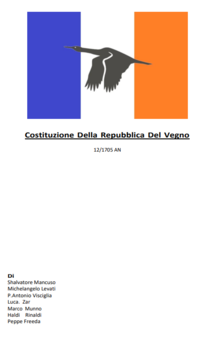Constitution of Vegno
| CONSTITUTION OF THE REPUBLIC OF VEGNO | |
| Original Title: | Costituzione della Repubblica del Vegno |
| Jurisdiction: | Republic of Vegno |
| Ratified: | 12/ 1705 AN |
| Date effective: | 12/ 1705 AN |
| System: | Semi-Presidential Republic |
| Branches of Government: | Three (Executive, Legislative, and Judicial) |
| Chambers: | One (The National Assembly) |
| Executive: | President of the Republic shared with
the Prime Minister |
| Judiciary: | President of the Republic;
Courts of Justice |
| Legislative: | The National Assembly |
The Constitution of the Republic of Vegno is the fundamental law of the State, which occupies the top of the hierarchy of sources in the legal system of the Republic: it is composed of 12 articles written and published in 12/1705 AN by the Seven Founding Fathers of Constituent Assembly of the Vegno.
The seven members of the constituent assembly were: Salvatore "Shalva" Mancuso, Michelangelo Levati, "P." Antonio Visciglia, Luca "Lo Zar" Zarrella, Marco "M.M" Munno, Haldi Rinaldi "Pane" e Peppe "Freeda" Cantore.
Text
The first twelve articles of the Constitution are the "Fundamental Principles", absent in the previous founding statutes, which expose the spirit of the Constitution. They include some of the supreme principles of the Constitution which are found implicit throughout the text
Preamble
The people of Vegno solemnly proclaims their fidelity to human rights and the principles of national sovereignty as defined by the Constitution of 1705 AN.
Form of Government
The Vegno is a semi-Presidential democratic Republic whose main offices are: The President of the Republic, the Parliament and the Prime Minister.
The President of the Republic of Vegno:
- The President of the Republic guarantees compliance with the Constitution. Through its arbitration, it ensures the regular functioning of public authorities and the continuity of the state. It is the guarantor of national independence, the integrity of the territory and compliance with the treaties.
- The President is elected directly by >22 years old citizens by universal suffrage and must be a vegnese citizen >50 years old.
- The President of the Republic appoints the Prime Minister. He terminates his duties upon presentation by the latter of the resignation of the Government. At the proposal of the Prime Minister, it appoints the other members of the government and puts an end to their functions. The President of the Republic chairs the Council of Ministers.
- The President promulgates the laws, can submit referendums, can dissolve the National Assembly, sign the ordinances and decrees approved by the Council of Ministers and assign civil and military offices to the State.
- The President accredits the ambassadors.
- The President is the head of the Armed Forces.
- The President, if the Nation is seriously threatened, can assume exceptional powers.
- The President has a series of his own prerogatives which do not require countersignature and other shared prerogatives which require the countersignature of the Prime Minister (or the minister responsible).
- The President of the Republic negotiates and ratifies (international) treaties.
- The President of the Republic is the guarantor of the independence of the judicial authority.
- The President of the Republic can be dismissed only in case of failure to fulfill his duties incompatible with the exercise of his mandate. The dismissal is pronounced by the Parliament meeting in the High Court.
The Government and the Prime Minister
- The Government determines and directs national policy. It has the administration and the armed forces. He is accountable to Parliament under the conditions and in accordance with the procedures.
- The Prime Minister directs the action of the Government. He is responsible for national defense. Ensures enforcement of laws. Without prejudice to the provisions of article 13, it exercises regulatory power and assigns civil and military offices.
The Parliament
- Parliament votes on the laws, checks and challenges the work of the Government, evaluate public policies.
- Parliament can cause a Government to fall if an absolute majority of the legislators votes for a motion of no confidence.
- Vegnese Parliament is also known as Assemblea Nazionale (National Assembly).
